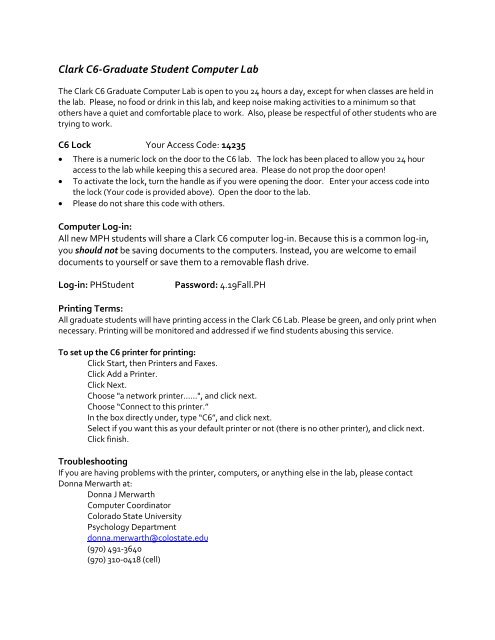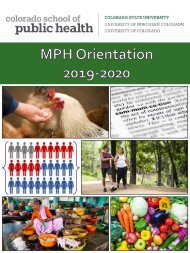Binder for website
Create successful ePaper yourself
Turn your PDF publications into a flip-book with our unique Google optimized e-Paper software.
Audrey Shillington, PhD<br />
Concentration Lead: Epidemiology<br />
Dr. Shillington is Professor and Director in the School of Social Work at CSU<br />
and in the Department of Epidemiology in the Colorado School of Public<br />
Health. Dr. Shillington’s research interests focus on adolescent and young<br />
adult risk behavior prevention and reduction, psychiatric epidemiology,<br />
psychometrics, alcohol and other drug use prevention and intervention.<br />
Lauren Shomaker, PhD<br />
Concentration at ColoradoSPH at CSU: Animals, People and the<br />
Environment<br />
Dr. Shomaker is an Assistant Professor in the Department of Human<br />
Development and Family Studies at CSU and in the Department of<br />
Community and Behavioral Health in the Colorado School of Public Health.<br />
Dr. Shomaker is a child clinical psychologist whose research interests center<br />
upon understanding the role of psychological functioning in the etiology, development, and<br />
prevention of obesity and obesity-related health problems such as type 2 diabetes. Her<br />
research seeks to elucidate to what extent psychological factors, such as depression and stress,<br />
promote excessive body weight gain and insulin resistance, the major physiological precursor<br />
of type 2 diabetes. She has a particular interest in identifying the behavioral and physiological<br />
mechanisms by which depression and stress influence developmental trajectories of weight<br />
gain and insulin resistance - theoretically, through emotional eating, being more sedentary,<br />
inadequate sleep, and stress hormones. In a series of randomized controlled clinical trials, we<br />
are testing whether mental health treatments <strong>for</strong> elevated depressive symptoms or stress in<br />
at-risk adolescents lead to improvements in their metabolic health, lessening future risk of<br />
developing major chronic diseases. Students working in the lab have an opportunity to learn<br />
about psychological, behavioral, and physiological assessments to study depression; stress;<br />
mindfulness; social functioning; nutrition and eating patterns such as emotional eating, eating<br />
in the absence of hunger, disordered eating, and binge eating; physical and cardiorespiratory<br />
fitness; obesity; and metabolic risk. Students are exposed to randomized controlled clinical<br />
trials utilizing a variety of therapeutic modalities, including cognitive-behavioral, mindfulness,<br />
and interpersonal psychotherapy.<br />
Page 25 of 30



